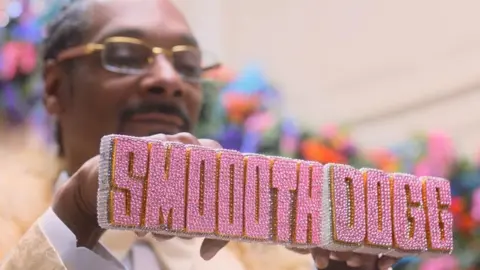Klarna: 'I got a £30 bill - but I didn't buy anything'
 Stephanie McDaid
Stephanie McDaidLast year, Glasgow-based Stephanie McDaid was surprised by a phone call out of the blue from her mum and dad.
She was puzzled when they said a parcel for her had been delivered to their house, her former address. The 26-year-old accountant hadn't done any clothes shopping online recently.
She arrived to find a Topshop parcel containing a black "going out" dress - not in her size - as well as an unexpected £30 bill from buy now, pay later firm Klarna.
"I've never used any services like Klarna, so I was wondering what on earth had happened," she says.
Stephanie phoned the firm immediately and after a couple of questions, it was confirmed she was a victim of identity fraud.
She is not alone. BBC News spoke to two other people who faced similar situations but did not want to be named, and campaigners have raised concerns about how easy it may be to sign up for buy now, pay later services in other people's names.
'I was lucky'
To use Klarna's pay later service, which defers payments for up to 30 days, shoppers only have to provide a name, email, date of birth, mobile number and billing address.
Fraudsters had signed up for the service using some of Stephanie's details - but forgot to change the delivery address to their own.
"I was really lucky. Klarna told me [fraudsters] would normally try to order one smaller item as a test to see if they would get away with it," she says.
"Unless I had intercepted it, they might have carried on ordering more items and racking up debt in my name."
While Stephanie was pleased that Klarna shut the fraudulent account quickly, she feels "frustrated" that this was allowed to happen.
When signing up for Klarna's pay later service, customers undergo a soft credit check.
"I would have thought a search would highlight the fact they were using a previous address of mine," she says. "I definitely think more protections could be put in place."
'Honeypot for fraudsters'
In recent years, the Swedish financial services company has boomed. Big retailers like New Look, H&M and Asos now offer Klarna as a payment method at online checkouts.
Customers can choose to pay for their goods in 30 days, split their payments, or they can pay with a credit or debit card which is processed by Klarna's software on a shop's behalf.
 Klarna
KlarnaBut critics of buy now, pay later services say such companies make it too easy for customers to fall into debt.
Alice Tapper has been campaigning for tougher regulation of the industry, and is concerned about the levels of fraud she has come across.
"Since launching the campaign, these cases of fraud have been worryingly common," she says.
"This is largely thanks to just how easy it is to use these products and the little information required to access them. It's a honeypot for fraudsters and it simply shouldn't be this easy."
The Financial Conduct Authority (FCA) is currently reviewing how the deferred payment market is regulated in the UK. Ms Tapper has submitted evidence to the review, which included concerns from several shoppers around identity fraud.
Klarna declined to tell BBC News how many incidents of fraud its customers had reported in 2020, but a spokeswoman said that the rates were "extremely low".
"We work closely with authorities, merchants and logistics partners to combat any potential fraud that we identify," she said.
"We are constantly enhancing our anti-fraud measures and security," she added, citing the recent introduction of "one-time passwords" sent to a customer's mobile to verify some payments.
Klarna also pointed out that for its instalments payment option, shoppers must supply a valid payment card.
Pandemic 'opportunities' for criminals
Amber Burridge, from fraud prevention service Cifas, says it is "critical" that shoppers stay on their guard when it comes to fraud, particularly in light of the coronavirus crisis.
"The continuing challenges around the pandemic and economic uncertainty have presented new opportunities for criminals to steal money and information from innocent members of the public," she says.
The organisation, which runs the National Fraud Database, says that identity fraud accounted for 60% of cases recorded in 2020. Victims under the age of 21 were also more likely to be impersonated for online retail products.

How do I protect myself against identity fraud?
- Shred anything you throw away or recycle with your name, address or financial details on it
- Never give away personal details if you receive an unsolicited text or email
- Check your statements carefully and report anything suspicious
- Ask Royal Mail to redirect your post for at least a year if you move house

Klarna also said that shoppers are covered by its buyer protection policy, which means that any money is refunded to fraud victims.
It recommends that customers report any suspicious incidents to Action Fraud, as well as its own team.
But campaigner Alice Tapper is calling for more to be done. She wants to see buy now, pay later services regulated by the FCA. That would mean that customers could contact the Financial Ombudsman Service to resolve disputes with a company over fraud, for example.
The results of the FCA's review into buy now, pay later services are expected next week.
But that has proven too late for Stephanie McDaid, who says she would be hesitant to use any buy now, pay later firm in the future.
"I feel the whole process would just be tainted for me."

Have you had issues relating to buy now, pay later firms? Please share your experiences by emailing [email protected].
Please include a contact number if you are willing to speak to a BBC journalist. You can also get in touch in the following ways:
- WhatsApp: +44 7756 165803
- Tweet: @BBC_HaveYourSay
- Upload pictures or video
- Please read our terms & conditions and privacy policy
If you are reading this page and can't see the form you will need to visit the mobile version of the BBC website to submit your question or comment or you can email us at [email protected]. Please include your name, age and location with any submission.
